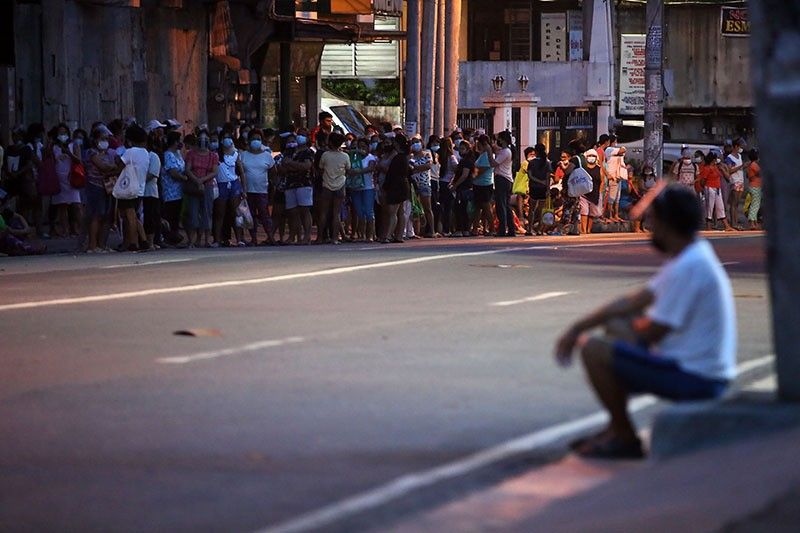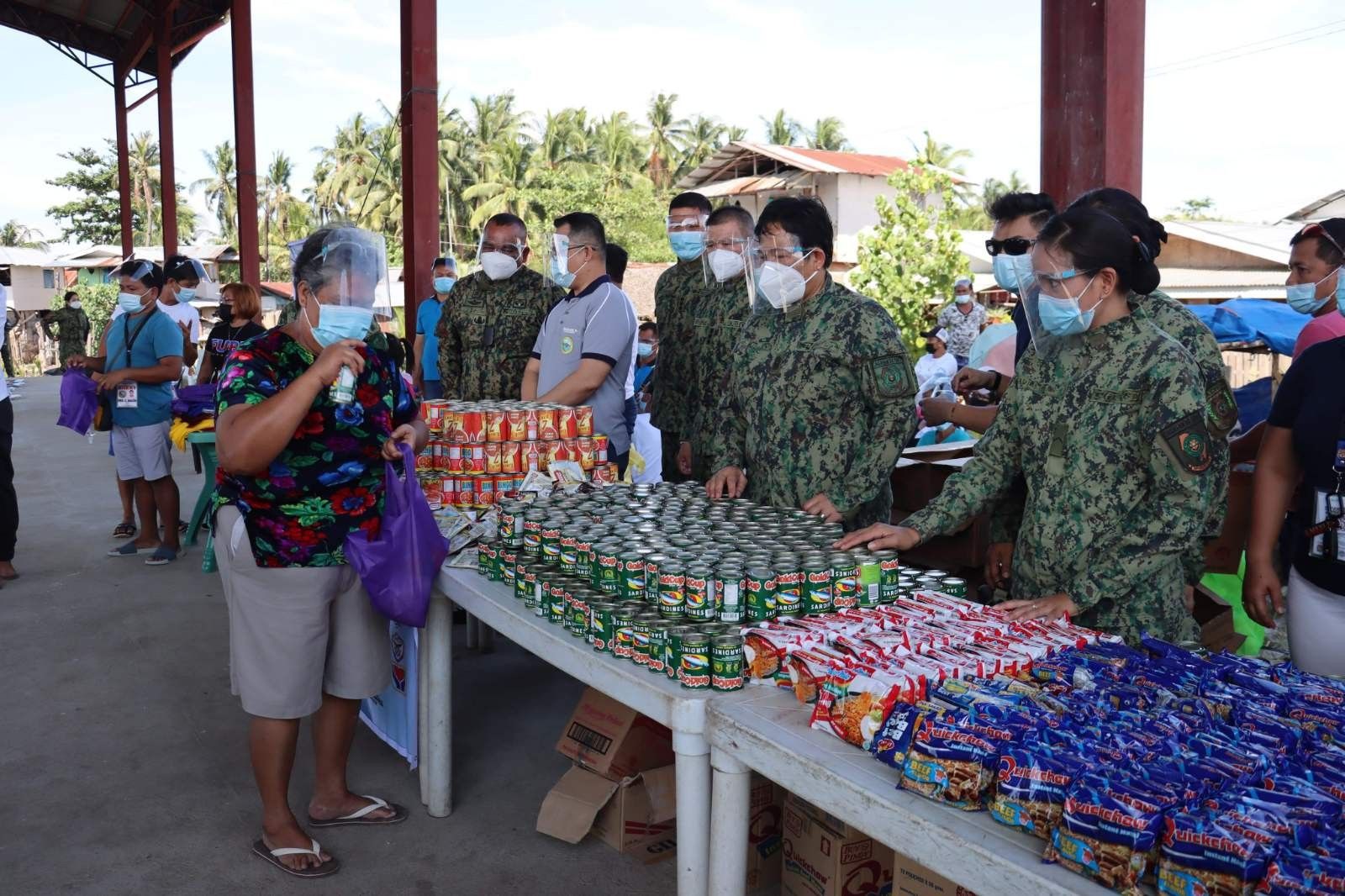Plot twist: From community pantries to police-run 'Barangayanihan'

MANILA, Philippines (Updated 10 a.m., April 27) — The government narrative on community pantries has shifted in the space of a week — from initially warning that they are linked to communist rebels to voicing support and, this week, putting up their own versions.
Recent police-led pantries acknowledge that the volunteer-run initiative not only serves the public but could also help them win the community over.
It's also a development that scholars warned in a paper published by the Philippine Sociological Society earlier this month that state actors could "hijack" the citizen movement.
"The Maginhawa community pantry captured the imagination of the public because of the simplicity of its objectives, but at the same time, it was also rooted in community [and] social network volunteerism and tried to empower the people through the element of reciprocity," UP Visayas - Tacloban professor Dakila Yee, a co-author of the paper, told Philstar.com in an email.
Community relations and 'beneficiary civilians'
According to a project brief from the PNP Directorate for Police-Community Relations acquired by Philstar.com on Monday, police community precincts have been instructed to "cite the Maginhawa community pantry as an inspiration" for their own "Barangayanihan Lugawan."
PCPs are outposts that are administratively under a police station.
The project is meant to "clearly manifest in respective PCPs that there's a clear partnership between the police and the community," the brief reads, adding "respective beneficiaries will take pictures of the activity and post in their respective [Facebook] accounts."
"These netizens can be planted beneficiary civilians so as to manifest community appreciations."
RELATED: Permit or not? Mixed messages as gov't unsure how to address community pantries
LOOK: Memo from Cagayan de Oro police "cites the Maginhawa community pantry as an inspiration" for the PNP's "Barangayanihan Lugawan" initiative and instructs cops to photograph "planted beneficiary civilians so as to manifest community appreciations" @PhilstarNews pic.twitter.com/KgLiKmJO1s
— Franco Luna (@francoIuna) April 26, 2021
"For other efforts not involving serving breakfast lugaw, don't use #LugawIsEssential," the project brief also reads, in reference to a hashtag that went viral after an incident at a barangay checkpoint where a delivery rider was accosted for trying to deliver lugaw during a curfew and for an interior department official's comments on Vice President Leni Robredo, whom government supporters refer to as "Lugaw".
READ: How the poor are active contributors in sustaining community pantries
Cops required to set up pantries?
Police Lt. Col. Joel Nacua, spokesperson for the Cagayan de Oro City Police Office confirmed to Philstar.com in a phone call that police in the area were required to set up community pantries of their own.
He stressed though, that the pantries are called "Barangayanihan", which he said willl run until May.
Nacua said resources for the pantries would be given by police personnel.
The city police spokesperson also played down reports of police harassment of organizers.
"It's probably just a misunderstanding. Police are just there to ensure orderly distribution. If there are a lot of people there, they should be observing health protocols and physical distancing, and we will deploy police visibility to do that," he said.
He added, despite reports of police personnel doing so anyway, that "it's prohibited for us to ask for personal data."
Imitation after 'intimidation'
READ: Harassment of community pantries leads to clamped operations
"Team [Quezon City Police District] held a KYUSIna ng Bayan where they distributed hot meals such as porridge and soup, food packs, and health kits, water to 33 barangays in the city. Up to 6,365 QCitizens benefited from QCPD’s feeding and food pack distribution," the Quezon City local government wrote in a Facebook post. on Monday
"It is part of the PNP Barangayanihan launched today."
This, despite the QCPD's social media account previously sharing a post that attempted to link the community pantries to communists. The Maginhawa community pantry that started the phenomenon is in Quezon City.
READ: QCPD yet to respond to city notice to explain red-tagging of community pantries
"What [happened] in Maginhawa [Street] serves as an inspiration, like a match that has made an explosion and the buck doesn't stop there," the Manila Police District said in its own post.
"Project po yan ng PNP Barangayanihan. Wala pa man po yan tumutulong na PNP sa pamimigay (Even without [Barangayanihan], the PNP was already helping distribute aid)," Police Lt. Col. Roberto Mupas, MPD spokesperson, told Philstar.com in a text message.
Manila police also said that "there is no truth that an individual is being profiled or red-tagged" after reports of a community pantry in the Pandacan district halting operations after police sought the organizers' personal details and affiliations.
In the same statement sent to reporters, Police Brig. Gen. Leo Francisco, district director, said that "there is nothing to worry about police presence" since they were only there to ensure health protocols are observed.
Renaming, reframing community pantries
Yee said that "these initiatives of government-led/government-driven pantries can be interpreted as a way for them to gain control of the terrain of the Community Pantries discourse...if we look at it from the government's side, they are interested on intervening, and steering the conversation on what a CP should look like, should sound like and how it should work."
"Renaming could be a way for the PNP to claim an initiative as their own, and to frame the activity according to their set of rules."
Noreen Sapalo, a Philippine Studies lecturer at the University of the Philippines Diliman, pointed out that "that PNP officers were prohibited from using the hashtag #LugawIsEssential is proof that this is a publicity stunt since embedded in this ECQ-related hashtag is an anti-state sentiment."
"Another example is the emphasis that the PNP memo has on building a partnership with the community and the 'planting' (worst choice of word) of civilians to 'cover' and post their initiatives on social media — since they do not really have a good reputation among community members."
She said that the pantries were "manifestations or evidence of state neglect and a failed pandemic response," which left the state "scrambling to hijack the stories and narratives that surround community pantries."
"Thus, the PNP's directive to put up their own community pantries, complete with their own branding and PR strategy, is clearly an attempt to hijack the narrative of mutual help and state neglect that the Maginhawa community pantry stands for," she said.
"If they really wanted to help, they could have fed hundreds or thousands of Filipinos even before the community pantry projects started — apparently, they have the money for this!"
"This plan stresses branding to make explicit the identification with state entities... PNP's denial that the Barangayanihan initiative is a version of the community pantry movement doesn't hold water, given that this state-run effort appeared after community pantries gained ground in different localities," cultural studies scholar Laurence Castillo also told Philstar.com in an e-mail exchange.
Castillo, a Ph.D. candidate at the Asia Institute of the University of Melbourne and a literary and cultural studies professor at the University of the Philippines Los Baños, called the effort part of a "massive effort to salvage the image of the state, particularly the police."
"Note how this initiative seems to be an effort to distance from the red-tagging of community pantries by NTF-ELCAC personalities, which backfired terribly...The timing of this state-run initiative thus only reveals how this seems to be more about riding the community pantry wave to score political points rather than genuinely fulfilling the mandate to serve."
READ: Another community pantry shuts down after profiling of Pandacan organizers
Community pantries prompted by 'absence of the State'
While government using its resources to help the community is commendable, scholars write in a paper for the Philippine Sociological Society that the concept behind the pantries is mutual aid in the face of a lack of government action.
"For the precariat, these community pantries enable translocal mutual aid between and among them, and for the increasingly disenchanted segments of the middle class, these community pantries have become outlets of their pent up exasperation over the absence of official action," the paper, first cited by Media Commoner, reads.
Written by Yee, and Josephine Dionisio, Arnold Alamon, Kidd Alonzo, Juwan Palanca, Ferdinand Sanchez II, Seiko Miho Mizushima and Joel Jan Alvarez, the paper pointed to "the public who, seeing the absence of the State, have created their own networks of mutual aid to get by as manifested by the community pantries."
Although it cannot be said that pantry organizers share the same political views, "that it became 'viral' indicates that these community pantries and what they stand for resonated with the public – temperance against greed, compassion over indifference, and mutual care in the face of institutional neglect."
They warned of the "very real danger" of "efforts this early by certain sectors to hijack the narrative and to rob this movement of its optimism and radical content."
They stressed that "the establishment of community pantries is a transgressive act that lets us see what may lie beyond the limits imposed by the 'natural order of things' and that these emergent agencies point us to the possibility of new political horizons."
READ: NCR mayors urge community pantry organizers to coordinate with LGUs first
The Palace has said that the pantries just show Filipinos helping each other and that these should not be "politicized", but, scholars said, this framing reduces the original intent of community pantries.
"Such an interpretation effectively de-politicizes the community initiatives and coopts these as mere acts of civic duty," the PSS paper reads. "If they are not coopting, the same interests dismiss these initiatives as staged and organized by the usual suspects — political enemies of the administration from the so-called yellowtards, or dilawans (Liberals) to the radical left represented by the [Communist Party of the Philippines-New People's Army-National Democratic Front]."
READ: DILG asks community pantries: Let barangays reach seniors in their homes
"In an atmosphere of counterinsurgency, expressions of solidarity, especially in organized forms, are held suspect by state forces. This has precedent of course in the previous year, when during the first lockdown, activists who were trying to deliver aid to some communities were arrested for allegedly violating quarantine protocol," Castillo said.
Philstar.com sought Police Brig. Gen. Ronaldo Olay, PNP spokesperson, for comment, though he has not responded as of this post.
'Bureaucratization' of pantries
For the scholars, the campaign is just as much a PR move as it is a hijacking of the narrative.
"We have to note the difference — BARANGAYanihan is not mutual aid initiative because this will come from the state's coffers...Not only is the state and the PNP threatened by the people's solidarity, [but] they also fear the growing anti-state or anti-government sentiment embedded in community pantries," Sapalo said.
Sapalo also pointed to the "renaming" of the community pantry to the 'Barangayanihan', saying: "They may give it a different name, but it obviously is a reaction to the Maginhawa Community Pantry and what it stands for...It's counter-propaganda, counter-insurgency and a publicity stunt rolled into one initiative — all to cover state failure."
Pilipino Star Ngayon: Fact check: Mga pahayag ng Malacañang sa 'community pantries'

"One possible scenario that we are starting to notice...is the possible 'bureaucratization' of the community pantry initiative...It raises the question, what makes a [community pantry] different from the typical food relief system if there is now bureaucratization?" Yee also said.
He said the community pantry concept can be scaled up, not necessarily by government adopting the idea, but by "for example, tying up with community-based farmer groups and associations to replenish products which in turn, may spark interests in community farming, and other solidaristic arrangements."
"Another possible way to capture the imagination is for [the pantries] to link up with other groups that try to reimagine how city life and city spaces are arranged."
(Editor's note: This article has been edited for brevity)
- Latest


























